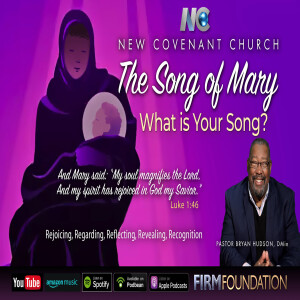
Summary of the Message: “The Song of Mary: What is Your Song?”
By Pastor Bryan Hudson, DMin. (Generated by OpenAI)
Download Worksheet: “Developing Your Song”
It is a testimonial, a joyful and faith-filled declaration of God’s mercy, faithfulness and power in fulfilling His purpose through chosen vessels.
Luke 1:46, And Mary said:“My soul magnifies the Lord, 47 And my spirit has rejoiced in God my Savior. 48 For He has regarded the lowly state of His maidservant; For behold, henceforth all generations will call me blessed. 49 For He who is mighty has done great things for me, And holy is His name. 50 And His mercy is on those who fear Him From generation to generation. He has shown strength with His arm; He has scattered the proud in the imagination of their hearts. 52 He has put down the mighty from their thrones, And exalted the lowly. 53 He has filled the hungry with good things, And the rich He has sent away empty. 54 He has helped His servant Israel, In remembrance of His mercy, 55 As He spoke to our fathers, To Abraham and to his seed forever.”
Pastor Bryan Hudson explores Mary’s Song, also known as The Magnificat (Luke 1:46–55), as both a biblical testimony and a model for personal reflection. Mary’s declaration of praise to God was not merely a song in the musical sense but a profound testimony of God's mercy, power, and covenant faithfulness.
Key Themes of the Message:
-
Your Song is Your Testimony:
Like Mary, every believer has a “song”—a personal testimony of God’s work in their life. This song is meant to glorify God and bless future generations, not just recount personal experiences. -
Five Elements of Mary’s Song:
-
Rejoicing – Worship and joy in God (v. 46-47)
-
Regarding – Humility in recognizing God’s favor (v. 48)
-
Reflecting – Acknowledging God’s legacy and mercy through generations (v. 49-50)
-
Revealing – Understanding divine purpose and justice (v. 51-53)
-
Recognition – Remembering God’s covenant and faithfulness (v. 54-55)
-
-
Application to Our Lives:
-
Believers are encouraged to reflect on their own song using these five elements.
-
Worship is more than singing; it is how we live and respond to God.
-
Testimonies should include humility, legacy, purpose, and an awareness of covenant relationship with God.
-
Mary's experience is uniquely maternal, highlighting the vital role of mothers in God’s redemptive plan.
-
-
Broader Biblical Context:
Dr. Hudson compares Mary’s song to other biblical songs—such as those of Moses, Miriam, Deborah, David, and the redeemed in Revelation—to show that songs often arise from deliverance and divine encounter. -
Call to Honor Mothers and Recognize Their Role:
-
The message honors the spiritual and physical significance of mothers, encouraging all to show gratitude while mothers are still present.
-
Birth, both physical and spiritual, is tied to God's greater plan and purpose.
-
Final Charge:
Dr. Hudson encourages listeners to reflect, write, and live out their own song, as a testimony of God’s mercy and purpose in their lives. Mary’s song, born of deep spiritual insight and humility, is a pattern for how believers today can shape their impact on the world and future generations.
No comments yet. Be the first to say something!